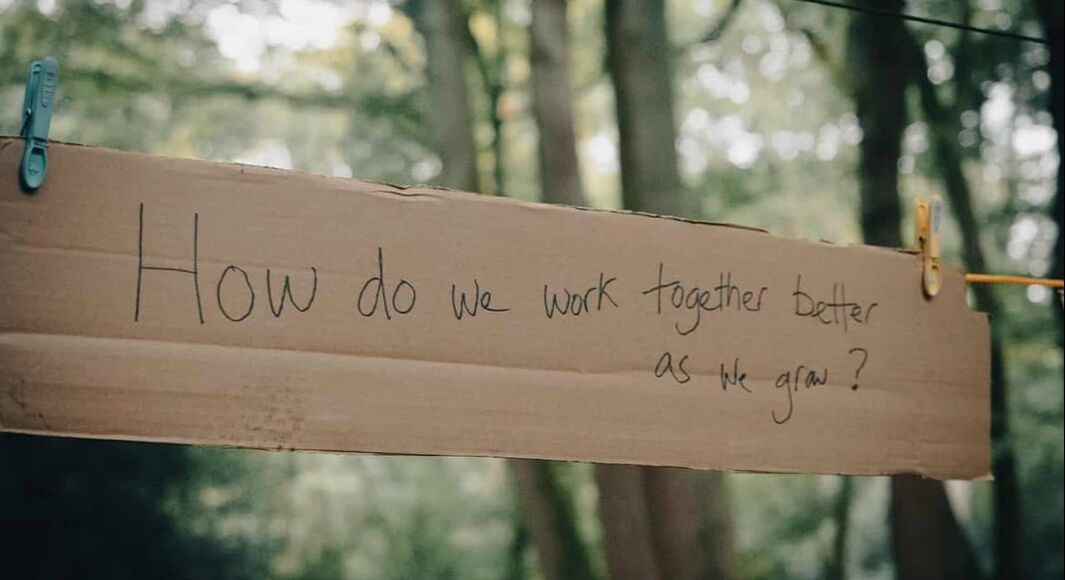|
If you are a CEO, senior manager, or team leader seeking to invigorate your team, make meetings, away days or offsites more effective, or drive impactful change, an external facilitator can be your key to success. The other day we were asked by a prospective client - an HR director at a large travel company - why they should use us to facilitate a team building programme for their middle managers, rather than just do it themselves. The company had been going through a lot of change and they felt middle managers needed supporting and enabling. Their need was for managers to get to know each other better and develop as a group so that they would work together better, and bring the benefits of that to the whole organisation. The HR director asked us for help with reasons why they should hire someone externally because she knew she would be asked by the CEO. So this blog post sets out reasons why to use an external facilitator - whether for a team away day, strategy session or managers development programme - and when it is a good idea. When to use an external facilitator Do you sit in team meetings where the same voices speak up while others remain unheard? Does the air in your company thicken with unresolved disputes and recurring conflicts among team members? Perhaps you feel like your team is running like a hamster on a wheel, endlessly circling issues without reaching decisive conclusions. If this resonates with you, an external facilitator - someone who is not a member of your organisation - might be just what you need. A skilled external facilitator can offer a fresh perspective, foster better relationships, and ensure that all voices are heard, paving the way for innovative ideas and solutions that guide your group to break free from unproductive cycles and catalyse meaningful progress on goals. As a leader or manager you don't always have to shoulder the burden of guiding every conversation and decision, so here are 6 reasons why external facilitators are worth the investment:
We go into each of these in more depth below. What an external facilitator does Firstly though to explain: an external facilitator's primary role is to guide your group towards agreed-on objectives in a way that encourages collaboration, ownership and creativity from all involved. Unlike an expert who offers solutions, or someone internal who may come to a meeting with a fixed outlook and biases, an external facilitator's job is to guide your group to think differently, using processes that help you explore ideas and solutions so that you make progress and take action. They will give consideration to the how of a meeting and the relationships too, not just the task or objective. 1. Fresh perspectives and different questionsWith their unique position, an external facilitator can help you shed new light on prevailing issues by asking different questions, designing unique experiential processes, and confronting assumptions and patterns. For instance, we often work with check-ins, team symbols, force field analysis, intuition walks, and different types of reflective questions. And by noticing how people respond in the moment, we can direct attention towards aspects the group may have overlooked or neglected, enabling you to see things with new eyes. By harnessing these and the collective intelligence and insights that are already present in the group, facilitation frees people to identify and share ideas and feelings that may not otherwise surface, leading to more creative outcomes. 2. Resolving conflict and valuing differenceIf you have ever sat in a team with someone who was angry - say with the leader or with someone else in the group - and it was not resolved, you’ll know how uncomfortable the lingering tension can feel. The conflict may be felt in every discussion, in people being negative about every decision and being unable to listen, affecting the team’s morale and performance, stifling creativity and ultimately causing other people to leave. Perhaps they were not angry but they disagreed with an important decision and you could never get past it as a group. In such situations, an external facilitator can be a godsend. If you try to resolve this yourself, you might find it hard to really listen or come up against issues of bias or power, where the person becomes more guarded or triggered, preventing an open honest discussion. The value of an external facilitator here is that they are impartial, they don't have any vested interest and are not trying to push people in a particular direction; their sole focus is to help the group make progress on difficult issues, and facilitate a productive dialogue where people can be honest, understand each other, and move through the issue. Their objectivity helps everyone feel heard and valued. Valuing people and allowing for feelings to be expressed in a safe way allows people to explore differences, and to integrate them. This helps the team collaborate effectively, and encourages fair discussions and decisions that are reached after fuller exploration - not internal politics, power or personal biases. 3. Empowering every voice in the roomEveryone has been in meetings where the same few voices dominate. It’s an easy pattern to fall into, but can be a natural barrier to progress, especially when quieter team members don’t engage, or hold back their best ideas and insights. An external facilitator will be paying attention to this, to better manage the dynamics of your team's conversations. They will be thinking about creating an environment where everyone can share their thoughts and ideas. Where every team member, even the typically quiet ones, is invited to contribute. The facilitator's job isn't just to guide the conversation but to ensure everyone can be heard, not just the few. 4. Keeping proceedings on trackA key part of a facilitator's role is to ensure that proceedings stay focused and productive, and make best use of your team’s time and energy. Avoiding difficult conversations? They can gently nudge the group to ensure that essential issues aren't side-tracked and your team's time is optimised. For example, we worked with one client where the management team complained of chaotic meetings that were often derailed on tangents, and no one stuck to the agenda. They felt frustrated afterwards but none of them was able to stop it happening. When they brought us in as facilitators, we were able to help them identify what was happening, to bring them back when appropriate, and to come up with strategies they could agree on together for how to fix it - in a way that best supported the team’s objectives and development. 5. Enhancing psychological safety and neutralising power dynamicsAnother one of our clients was continually frustrated that members of their team never said what they really felt. When we dug into it, we found that one or two team members didn’t feel safe to speak up in front of their boss - the company was very hierarchical and although the boss was supportive, they also didn’t know how to set boundaries, which left some people feeling frustrated and affected other people’s confidence. As external facilitators we worked with them to create an atmosphere where everyone felt safe to share their views, fostering more open and courageous conversations. Why is this important? Unexpressed feelings, unexplored differences or unresolved relationship issues could potentially be the crux of a problem or the genesis of a breakthrough idea. When people feel safe, they are more likely to be honest and authentic and bring their whole selves to the table. This leads to more dynamic and fruitful discussions, uncovering insights that would otherwise remain hidden and causing people to feel more motivated. Tapping into the unutilised reservoirs of group dynamics can often be the catalyst that propels teams towards high performance and success. In our client’s group above, they started sharing more and got stuck less. However, enhancing psychological safety isn't straightforward. Existing power dynamics within a team can get in the way. For instance, junior team members often hesitate to voice their opinions to senior colleagues. And if there are trust issues between team members, conversations can become tense and unproductive. An external facilitator can help your team break down these barriers. 6. The way to bring out the best in people - clue: Nature helpsThe real value of external facilitation comes from being able to hold space for different kinds of conversations and for ensuring that existing patterns and issues of power don’t get in the way. Existing dynamics and hierarchies can be reinforced when away days and offsites are run internally - as it can be harder for people to step out of their usual roles within existing structures, which may prevent them from fully engaging and being open and authentic. This is especially important if there is change happening which people have strong feelings about. Hiring a facilitator to help your team work together better and to do that work in Nature is even more humanising and more quickly brings out the best in people, so that you make better connections and have deeper conversations. Nature is the great leveller, and is associated with greater group bonding and cohesion, and enhanced outcomes. ConclusionIf you want improved connections, more profound conversations and better away days and offsites, an external facilitator helps create an environment where people feel safe to express themselves authentically without fear of judgement or criticism. They can foster a more inclusive and balanced group dynamic by facilitating honest and open discussions. They offer an unbiased, fresh perspective and help you navigate power dynamics, allowing everyone's voice to be heard. Their presence encourages participants to think more profoundly and openly share their perspectives. This enables teams to release any tension that may be present, allowing them to move forward with new ideas and innovative solutions. Imagine the potential that could be unlocked in all aspects of your team’s performance by engaging a facilitator to create an environment of trust and respect. Doing this in Nature is even more powerful. So how does School of the Wild fit in? As experienced facilitators, we understand how important team building and development are for your organisation and are here to help.
From your team's away days or offsites to strategic planning sessions, if you're ready to take the next step in your team's journey, reach out to us. We'll discuss how to create an affordable and truly impactful team-building away day or offsite programme - in Nature - that can help your team progress.
0 Comments
Your comment will be posted after it is approved.
Leave a Reply. |
Author & CuratorNigel Berman is the founder of School of the Wild. Archives
March 2024
|
Leaders |
About Us
Support |
|



 RSS Feed
RSS Feed



